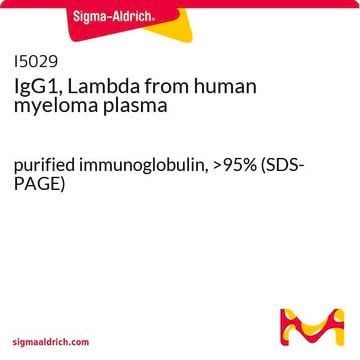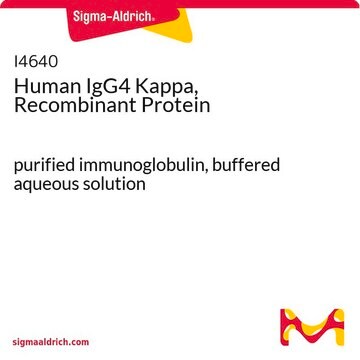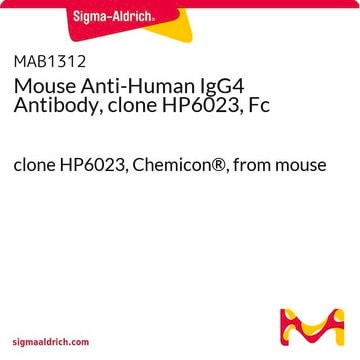411492
Mouse Anti-Human IgG₄, Fc Fragment Specific (HP6025)
liquid, clone HP6025, Calbiochem®
Sign Into View Organizational & Contract Pricing
All Photos(1)
About This Item
UNSPSC Code:
12352203
NACRES:
NA.46
Recommended Products
biological source
mouse
Quality Level
antibody form
purified antibody
antibody product type
secondary antibodies
clone
HP6025, monoclonal
form
liquid
does not contain
preservative
manufacturer/tradename
Calbiochem®
storage condition
OK to freeze
avoid repeated freeze/thaw cycles
isotype
IgG
shipped in
wet ice
storage temp.
−20°C
target post-translational modification
unmodified
General description
Purified mouse monoclonal antibody. Recognizes human IgG4 Fc fragment.
This Mouse Anti-Human IgG₄, Fc Fragment Specific (HP6025) is validated for use in Enzyme Immunoassay for the detection of Human IgG₄, Fc Fragment Specific.
Application
Enzyme Immunoassay (10 µg/ml, see application references)
Packaging
Please refer to vial label for lot-specific concentration.
Warning
Toxicity: Standard Handling (A)
Physical form
In PBS, pH 7.4.
Reconstitution
Following initial thaw, aliquot and freeze (-20°C). Avoid more than 5 freeze/thaw cycles.
Other Notes
Antibody should be titrated for optimal results in individual systems.
Cross-reactivity by ELISA against human myeloma proteins:
Human IgG1: ≤0.1%
Human IgG2: ≤0.04%
Human IgG3: ≤0.02%
Human IgG4: 100%
Human IgA: <0.1%
Human IgE: <0.1%
Human IgM: <0.1%
Cross-reactivity by ELISA against chimeric antibodies:
Human IgG1: <0.01%
Human IgG2: <0.01%
Human IgG3: <0.01%
Human IgG4: 100%
Human IgA: <0.01%
Human IgE: <0.01%
Human IgM: <0.01%
Cross-reactivity by ELISA against human myeloma proteins:
Human IgG1: ≤0.1%
Human IgG2: ≤0.04%
Human IgG3: ≤0.02%
Human IgG4: 100%
Human IgA: <0.1%
Human IgE: <0.1%
Human IgM: <0.1%
Cross-reactivity by ELISA against chimeric antibodies:
Human IgG1: <0.01%
Human IgG2: <0.01%
Human IgG3: <0.01%
Human IgG4: 100%
Human IgA: <0.01%
Human IgE: <0.01%
Human IgM: <0.01%
Hamilton, R.G. 1990. Ann. Biol. Clin.48, 473.
Fasullo, F.J., et al. 1989. Clin. Chem.35, 364.
Jefferis, R., et al. 1986. Immunol. Letters10, 223.
Fasullo, F.J., et al. 1989. Clin. Chem.35, 364.
Jefferis, R., et al. 1986. Immunol. Letters10, 223.
Legal Information
CALBIOCHEM is a registered trademark of Merck KGaA, Darmstadt, Germany
Not finding the right product?
Try our Product Selector Tool.
Storage Class Code
10 - Combustible liquids
WGK
WGK 1
Flash Point(F)
Not applicable
Flash Point(C)
Not applicable
Certificates of Analysis (COA)
Search for Certificates of Analysis (COA) by entering the products Lot/Batch Number. Lot and Batch Numbers can be found on a product’s label following the words ‘Lot’ or ‘Batch’.
Already Own This Product?
Find documentation for the products that you have recently purchased in the Document Library.
D C Houpt et al.
Infection and immunity, 62(7), 2857-2864 (1994-07-01)
Serum obtained from normal human subjects contains antibodies reactive in an enzyme-linked immunosorbent assay with the glucuronoxylomannan (GXM) of Cryptococcus neoformans. The frequency of occurrence of class-specific antibodies among normal subjects was 28% for immunoglobulin G (IgG), 98% for IgM
H Lu et al.
Infection and immunity, 61(6), 2400-2407 (1993-06-01)
The aims of this study were to determine the immunodominant antigens of Actinobacillus actinomycetemcomitans serotype b (Aab) for the different immunoglobulin (Ig) classes and subclasses and to determine the relative levels of these different Igs in serum. Seropositive early-onset periodontitis
S Sievers et al.
Clinical and experimental allergy : journal of the British Society for Allergy and Clinical Immunology, 47(8), 1057-1068 (2017-03-28)
Microarray-based component-resolved diagnostics (CRD) has become an accepted tool to detect allergen-specific IgE sensitization towards hundreds of allergens in parallel from one drop of serum. Nevertheless, specificity and sensitivity as well as a simultaneous detection of allergen-specific IgG4 , as
R G Keller et al.
Infection and immunity, 62(1), 215-220 (1994-01-01)
Previous studies found that normal human serum (NHS) contains an immunoglobulin G (IgG) antibody that mediates initiation of the classical complement pathway by nonencapsulated Cryptococcus neoformans. The present study used an enzyme-linked immunosorbent assay with whole nonencapsulated yeast cells as
Our team of scientists has experience in all areas of research including Life Science, Material Science, Chemical Synthesis, Chromatography, Analytical and many others.
Contact Technical Service








